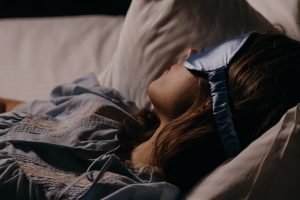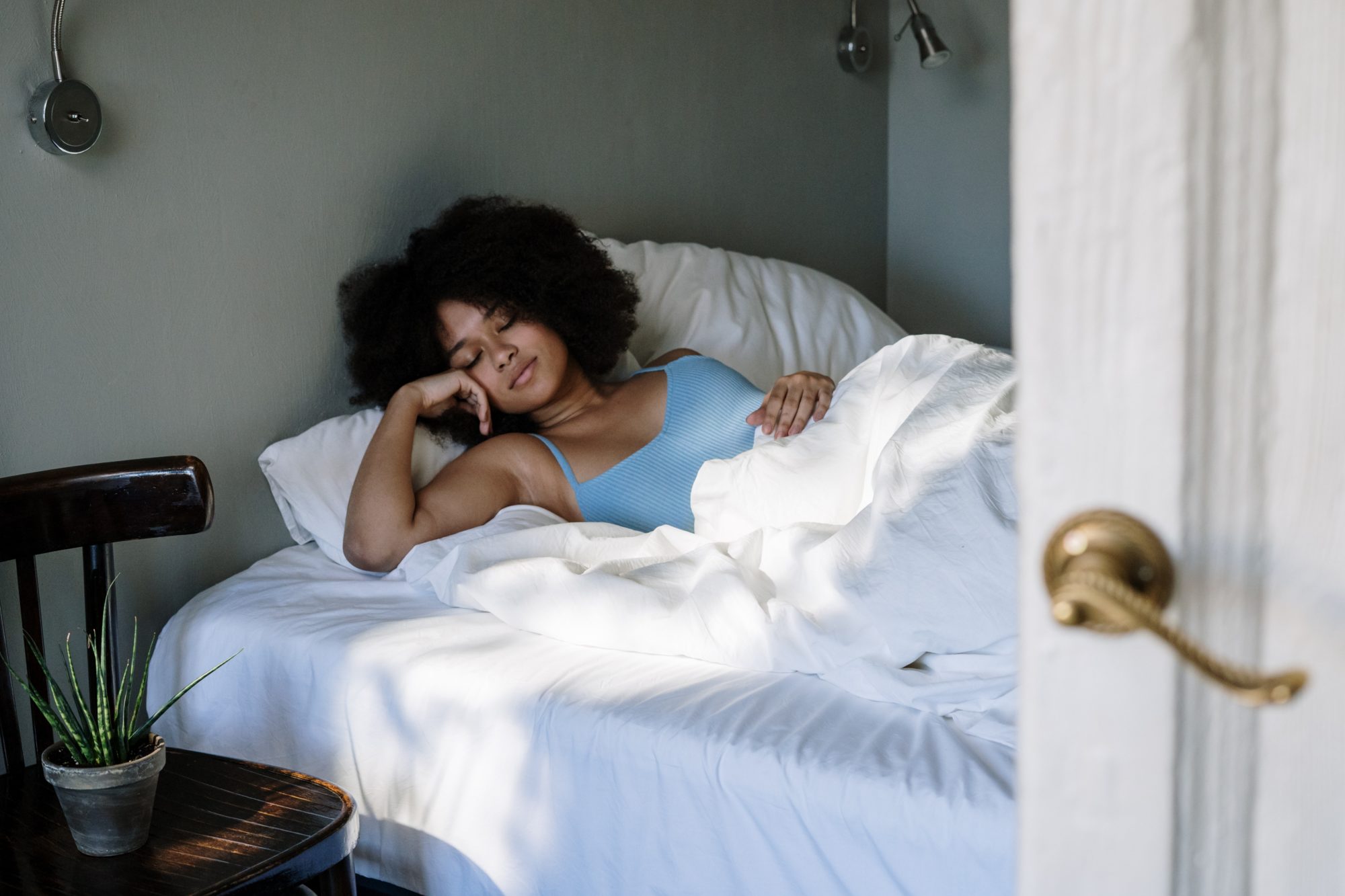Insomnia is a sleep disorder in which the sufferer is unable to fall and/or stay asleep with relative ease. They may have the most difficulty falling asleep, staying asleep through the night (or designated sleep period depending on work schedules, etc.), waking up too early, or suffering from a combination of these factors. The definition of an insomniac, therefore, is a person who suffers from insomnia, or as per the Oxford Dictionary, a person who is ‘regularly unable to sleep.’
According to the NCOA (National Council on Aging), depending on their age, adults require a minimum of 7-9 hours of sleep within each 24-hour period.
In the UK, insomnia is thought to regularly affect approximately a third of people, and is particularly prevalent among the elderly. Meanwhile, US statistics from the NCOA report that around 30% of American adults have symptoms of insomnia.
While the majority of insomnia sufferers do not go on to develop a long-term condition, even trouble sleeping in the short term can wreak havoc with daily functioning, leading to difficulty concentrating, regulating emotions effectively, and more.
How long can we survive without sleep?
The longest period of time that a human has been known to have gone without sleep is 11 days and 25 minutes – the world record set by 17-year-old American man, Randy Gardner in 1963. Others claim to have beaten this record, but their attempts weren’t as closely monitored, so they were unverifiable.
The effects of severe sleep deprivation are well researched and understood, with symptoms such as irritability, cognitive rigidity, memory issues, paranoia, heightened blood pressure, difficulties with vision and speech, mood changes, and even hallucinations occurring.
The longer-term side effects of sleep deprivation can be serious and potentially fatal. There are no verified cases of anyone staying awake longer than the 264 hours that Gardner completed, so researchers cannot know conclusively how long humans can survive without sleep. However, studies using lab rats found that fatalities occurred within a month of being deprived of any sleep.
There is a hereditary condition called fatal familial insomnia, in which sufferers are unable to sleep altogether, but thankfully this disease is considerably rare.

Types of insomnia
The type of insomnia suffered is principally classified as either:
- Short-term insomnia – otherwise known as acute or adjustment insomnia, short-term insomnia is a brief episode of sleep disturbance issues, often caused by the stress hormone cortisol or a stressful event, such as a major job or relationship change, loss of a loved one, receiving a distressing medical diagnosis, etc., OR;
- Chronic insomnia – once a person has difficulty falling and/or staying asleep for a minimum of three nights a week for three months or longer, the pattern is classified as chronic insomnia. It may also be caused by stress, but it can also be related to persistently poor sleep hygiene, mental health disorders, chronic pain, medications, and more.
A further breakdown of differing types of insomnia can also be referred to as:
- Secondary insomnia – previously known as ‘comorbid insomnia’, secondary insomnia is that which is believed to be caused by another condition, such as sleep apnea, anxiety, depression, or pain
- Sleep onset insomnia – difficulty falling asleep
- Sleep maintenance insomnia – difficulty staying asleep through the night
- Early morning awakening insomnia – persistently waking up too early
- Mixed insomnia – a combination of the above factors
What are the symptoms of insomnia?
Given how dependent we are on good sleep for resting our well-being both physically and mentally, there is a fairly wide variety of symptoms that can result from insomnia.
Aside from the frustration of disrupted sleep itself, insomnia can cause other symptoms, such as:
- Daytime sleepiness and fatigue/low energy
- Irritability (that can become chronic)
- Depression
- Anxiety
- Low mood and a lack of motivation
- Poor focus and concentration
- Poor memory recall
- Headaches and migraines
- Diminished coordination, leading to accidents
- Gastrointestinal issues
- Heightened emotional sensitivity/difficulty regulating emotions
These symptoms can lead to a wide range of secondary effects, such as poor productivity, anxiety regarding sleep, abuse of medications or other substances in attempts to sleep, isolation, and increased accident risks, such as falls and motor vehicle accidents.
Sleep deprivation can, in turn, create problems with managing everyday tasks and responsibilities, such as with school work, careers, and parenting duties
Additionally, long-term insomnia can play a pivotal role in the development of a range of chronic diseases, including:
- Obesity
- Clinical depression
- Cardiovascular disease
- Diabetes
What causes insomnia?
Multiple physical, psychological, and environmental factors can play a role in causing insomnia. Most often, the condition is a temporary issue brought about by stress or a short-term medical issue, or untreated condition.

Common environmental and/or situational causes include:
- Jet lag
- Shift work hours
- Caring for infants, children, the unwell, or the elderly
- Temperature – if the room is too hot or cold
- Noise – such as with inconsiderate neighbours
- Using blue-light devices before bedtime
- Experiencing bad dreams or night terrors
- Effects from the use of recreational drugs and alcohol (alcohol may assist in falling asleep in some individuals but typically promotes wakefulness and poor sleep quality overall)
- Getting too little physical exercise throughout the day
Mental health issues can cause a person to suffer from insomnia. These challenges may include:
- Depression
- Generalised anxiety disorder
- Bipolar disorder
- ADHD and Autism
- Schizophrenia
Some physical medical health conditions can also make it difficult to sleep, such as:
- Sleep apnea
- Chronic pain
- Heart disease
- GERD (Gastroesophageal Reflux Disease)
- Overactive thyroid
- Restless leg syndrome
- COPD (Chronic Obstructive Pulmonary Disease)
- Parkinson’s disease
- Alzheimer’s disease
In patients with Alzheimer’s disease, changes occur in the brain that can disrupt the regular course of sleeping patterns. This can also be experienced as a result of hormonal changes, such as with menopause. Not only is insomnia a common complaint among menopausal women, but the night sweats that many experience interrupt their sleep in addition to any other disruption to their regular sleeping patterns. Melatonin, the hormone naturally produced by the brain to promote sleep, decreases as we age, which is one of the reasons that menopausal women and the elderly commonly experience increasing difficulties with sleeping well.
Nocturnal blue light
Research and several studies show that the use of electronic devices that emit light prior to bedtime can cause and/or exacerbate sleep issues. This is because when we are exposed to the blue-wavelength light that modern electronic devices most commonly emit (such as smartphones and iPads) during our bedtime routine, our body’s natural melatonin production and release can be suppressed, causing neurophysiological arousal.
Our body naturally produces melatonin in accordance with the rising and setting of the sun, and as it is excreted as the sun goes down, our brain and body begin to prepare themselves for sleep. Exposure to artificial lights, such as the blue light emitted from the devices we use, can block this natural cycle, and thus make it difficult to fall asleep.
This is one of the reasons why experts recommend that the use of screens, particularly hand-held ones, be avoided two hours prior to going to bed. This is even more important for those whose melatonin production may already be lower and anyone already struggling to get a good night’s sleep.
Additionally, the use of modern devices such as smartphones is often indicative of engaging in social media and gaming-related activities that can be too arousing and overstimulating to the senses prior to sleeping.
What about medications?
While some medications may either directly or inadvertently assist with getting better sleep, others do just the opposite, with sleep disruption being a common side effect of an otherwise effective drug. Common drugs that indirectly affect our sleep negatively include:
- Beta-blockers – typically prescribed to treat arrhythmias and high blood pressure (among other things), beta-blockers can also cause nightmares and wakefulness, as they are thought to inhibit melatonin secretion
- Corticosteroids – used to treat inflammation caused by a wide range of conditions, corticosteroids also put the adrenal glands under a lot of pressure, which can make it difficult to relax and get to sleep
- SSRI antidepressants – not all antidepressants cause sleep disturbance, but SSRIs (Selective Serotonin-Reuptake Inhibitors) can and do, although the exact reason for this isn’t known
- Alpha-blockers – commonly used to treat high blood pressure and urinary complications related to prostate issues, alpha-blockers are linked to a decrease in REM (Rapid Eye Movement) sleep, and feeling sleepy or sedated during the day
- Statins – Statins are prescribed to treat high cholesterol, with muscle pain being the most common side effect. It is the pain that statins can cause that is typically the reason users experience difficulties sleeping
Other commonly prescribed medications that can affect sleep include Cholinesterase inhibitors (for Alzheimer’s disease and other dementia-related illness), Angiotensin II receptor blockers (for coronary artery disease), and glucosamine and chondroitin (for joint pain and inflammation).
If you suspect that your prescribed medications are causing sleep disturbances or insomniac nights, it’s important to consult with your doctor before changing any of the treatments. Your medical health professional may be able to offer alternatives or otherwise assist with reducing the sleep problems as a treatable side effect.
Treatments for insomnia
Depending on the cause of the insomnia, there is a wide variety of solutions that can help, such as:
- Prescription medications
- Over-the-counter sleep aids
- Melatonin supplements and medications
- CBT (Cognitive Behavioural Therapy)
- Counselling
Healthy sleeping habits
One of the first things to consider when attempting to improve sleep and solve sleep disturbance issues is to address your sleeping habits. Healthy sleeping habits include:
- Establishing a regular routine, including the time you go to sleep and awaken every day
- Avoid using screen devices before bed (preferably within two hours of bedtime)
- Engage in routine relaxation activities before bed, such as taking a bath or reading a book
- Avoid consuming caffeine after midday (or altogether)
- Ensure that your bedroom is set to a comfortable temperature
- Limit or avoid alcohol intake, especially within two hours of going to bed
- Fit your windows with blackout curtains or blinds to keep the room dark

Stress-relieving habits
Taking the time to actively reduce stress can help in overcoming sleep disturbance issues. Suggestions include:
- Exercising regularly, even if it’s primarily taking a walk each day (avoid exertive exercise within 3-4 hours of planned sleep)
- Meditation
- Yoga
- Doing breathing and other relaxation exercises, particularly just before bedtime
- Swap watching the television for reading at night
- Finding new hobbies to enjoy that relax you, such as singing or gardening
It is important that you seek medical attention if you are suffering from any mental health issues, as this can affect your sleep as well as a range of other health factors. It’s natural for us to feel a little down or worried from time to time, but if such feelings become acute and/or persistent, you must consult with a Doctor.
Music and music therapy for insomnia
According to a growing body of evidence, research tells us that listening to calming music is a powerful sleep aid with significant health benefits, including relaxation, lowering cortisol (the stress hormone). Studies show that adults who listen to soothing music for 45 minutes before going to sleep experience a greater quality of sleep, with immediate results.
Both men and women suffer from insomnia, but it is more prevalent in women. One particular study into insomnia in women tracked how long it took for participants to get to sleep, both before and after calming music was added to their sleep routine. Without the music, it took an average of 48 minutes for the women to fall asleep; with the music playing, the average time it took them to fall asleep dropped vastly – all the way down to an average of just 9.5 minutes.
Research demonstrates clearly that music can positively affect our sleep due to the effect it has on our brains. Listening to soothing music helps to calm our nervous system, thus reducing our cortisol levels and leaving us feeling less ‘alert.’ It can also cause our body to release dopamine (the happy hormone) which has been found to reduce feelings of anxiety and even pain.
Music also helps to drown out background noises that could otherwise affect our sleep, such as traffic, neighbours, local business activities, and more, depending on our living environment).
What music is best for insomnia?
There is no one type of music that is known to categorically impact sleep and relaxation in a positive way, as we are all so different. That said, typically speaking, listening to music with a slower, calmer tone is reported to have the greatest impact, although, within this vast genre, particular preferences will factor in; one person is soothed by pan pipes, while for the next, it may be a sound that evokes feelings of irritability.
When considering playing music as a sleep inducing tool, the tempo is one of the most important considerations. Our normal resting heart rates range between 60 – 100 Beats Per Minute (BPM). Since the theory is that calming, meditative music works because our body aligns with the musical rhythm, most sleep tracks are created at around 70 BPM.
Incorporating music into your sleep routine
At Myndstream, we’re passionate believers in the power of music to soothe, heal, invigorate and more, and we make a vast assortment of relaxing music available on our platforms to suit everyone’s tastes and needs.
To effectively incorporate music into your nightly routine, first, make sure that you find the right music for you, or consult with a music therapist. Tracks that make you feel relaxed, and don’t feature any problematic sounds or tempos that heighten your senses. It’s best to try some out during the day in preparation.
Additionally, avoid choosing any music that evokes any intense emotional reactions; steer clear of songs that carry heavy memories – whether happy or sad these can heighten your senses and alertness when you are trying to zone out.
Insomnia is a common problem that many of us will face, at least in the short term, at some point in our lives. Initially, addressing sleep hygiene practices and using the power of meditative sleep music can greatly improve your sleep. You can listen to our mediation playlist through the following link: https://myndstream-staging-2.onyx-sites.io//meditation-sleep-music/.
If you find that your sleep is becoming acutely and persistently troublesome, be sure to consult with your doctor.
Read More: Spa music: How can music create an immersive experience for your spa customers?


